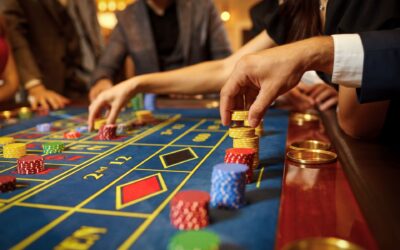In September 2008, Senator Robert Menendez (D.-NJ) introduced his first proposal to legalize Internet poker, S.3616. It didn’t go anywhere, not even getting a single co-sponsor.
Still, this was probably the first time a bill had ever been introduced in the U.S. Senate for the purpose of legalizing, rather than prohibiting, online games like poker. The fact that the Senator was from a state like New Jersey, with a politically powerful landbased casino industry, made the action politically significant.
Most of the movement to legalize Internet gaming has come from the U.S. House of Representatives, most notably from Barney Frank (D.-MA). Frank has so much seniority, and the Democrats have such a large majority, that he can get any bill he wants through the House. But to become law, it must also pass the Senate, and be signed by the President.
Barack Obama will not veto a bill from the Democratically controlled Congress. Which means everything depends upon having a Senator shepherd a bill through various committees, including a final conference committee with the House.
So it is politics, not policy, that is driving the campaigns to clean up the mess left by the Unlawful Internet Gambling Enforcement Act (“UIGEA”). For example, all the bills expressly outlaw sports betting, only because collegiate and professional sports leagues are too powerful and too much against it.
Frank would like people to be able to do just about anything they want in the privacy of their own homes. So his bills would legalize all forms of Internet gambling, (except, of course, sports betting). He has now gathered approximately 60 co-sponsors, including Representatives with landbased casinos in their districts.
But Menendez may have a better shot, with a bill limited to poker and other games of skill. He introduced his new “Internet Poker and Games of Skill Regulation, Consumer Protection, and Enforcement Act,” S.1597, (“i-Poker Act”) on August 6, 2009.
The i-Poker Act is designed to be a companion bill to Frank’s “Internet Gambling Regulation, Consumer Protection, and Enforcement Act,” H.R.2267, and the others introduced earlier this year to legalize online gaming. These include H.R.2266, to delay implementation of the UIGEA’s regulations for one year, and H.R.2268, main author Jim McDermott (D.-WA), to set up the tax structure.
The i-Poker Act goes into much greater detail than these other bills, especially in areas that relate to protecting the public and compulsive gamblers. Yet, it is also more limited, because it authorizes only “an Internet-based game in which success is predominantly determined by the skill of the players, including poker, chess, bridge, mah-jong and backgammon.”
Where the i-Poker Act first runs into trouble is in defining poker. I have testified as an expert witness on what is, and what is not poker. It’s not easy. But it is certainly not this:
“The term ‘poker’ means any of several card games that are commonly referred to as poker; that are played by 2 or more people who bet or wager on cards dealt to them; in which players compete against each other and not against the person operating the game; and in which the person operating the game may assess a commission fee or any other type of fee.”
Having seen how “the game commonly referred to as bingo” has resulted in unending confusion under the Indian Gaming Regulatory Act, I suppose I should thank Sen. Menendez for helping to make so much work for lawyers.
The i-Poker Act creates another great make-work project for gaming attorneys. The bill would exempt from licensing any game of skill that is now “not regarded as gambling under an applicable provision of State or Federal law . . .” What does that mean for a state like Colorado? A jury there ruled that poker was not gambling because it was predominantly skill, but the trial judge then decided that in future cases no evidence on skill versus chance would be admitted, because Colorado law only requires that there be money bet on a game with at least some chance.
The i-Poker Act is clear in some areas. For example, no one will be able to set up a club filled with terminals for online poker play.
The bills in the House and Senate all appear to set up a federal licensing and regulatory system in the Department of the Treasury. But both allow state and tribal gaming authorities to be approved by Treasury to certify applicants and even take over all regulation.
Overseas operators who stopped taking bets after passage of the UIGEA in 2006 are anxious to get back into the U.S. market. It is far from clear whether either set of bills would allow that.
Both contain language that looks like it was designed to exclude foreign operators. Treasury is prohibited from granting a license to anyone who failed to file a federal or state tax return that they should have. And the bills do not allow applicants to cure their mistakes. So, if someone finds an obscure state tax form that should have been filed for “doing business” in that state, the web operator is barred forever.
On the other hand, the i-Poker Act has express language, missing from the House bills, declaring that an operator who files an application within the first 90 days, cannot be denied a license on the ground that the applicant operated an Internet poker site and took bets from the U.S. In fact, this language looks like even operators who are still aiming their poker sites at the U.S. market can be licensed.
This would be a break from conventional gaming law. Under most state statutes, applicants are automatically unsuitable if they have been convicted of a felony or any misdemeanor involving illegal gambling. Many jurisdictions extend this to anyone who has participated in unlawful betting, even if never convicted. As GamingIntelligence.com recently headlined, France’s Budget Minister announced that the government would look at online operators’ current activities when deciding who gets licensed: “French Online Gaming Licenses ‘Not for Lawbreakers.’”
Both the House and Senate bills would make it illegal to take bets without the Treasury license. Cheating would be a crime, punishable by up to five years in prison. But there is no penalty stated, other than a 50% tax on deposits, for running an honest game without a license.
The i-Poker Act, however, has another means of enforcement: It requires the Director of the Financial Crimes Enforcement Network (“FinCEN”) to make up a list of every unlicensed website that takes bets from the U.S. Anyone, including law enforcement agents and players, can ask for this list, and get detailed information about owners and operators. And all banks and other payment processors within the jurisdiction of the federal government will then be on notice that they cannot transmit any money to these website operators.
All the bills allow states a short 90 days to opt out. There are fairly clear provisions that if the governor of a state fails to send a letter to Treasury opting out, that state’s anti-gambling laws will be pre-empted. In practice, this will mean that licensed operators from a state like Nevada will then be free to operate games aimed at players in big states that can’t get their acts together, like California.
There are complicated provisions involving tribes. This is an area that will need to be thought through completely. There are dozens of tribes that can act very quickly, to license themselves and others to take bets from everyone else, while demanding that no other licensees be able to take bets from anyone physically on their land.
Taxes might be a problem. The Frank bills have no limit on what taxes states can impose on operators, but limit the federal government to what is called a fee of 2% on deposits. The i-Poker Act increases that to 5% for the federal government and another 5% for states and tribes. This does get over the big problem with the Frank bills, that the big states, like California, where the customers will be, have no incentive to support Internet gambling operated and taxed by Nevada. Under the i-Poker Act, California gets that 5% tax. Although the states won’t like this provision: If a player is on Indian land, that tribe gets the full 5% and the state gets nothing.
The regulating state, like Nevada, can tax gross gaming revenue, or impose even a third tax on funds on deposit, if the operator has a physical presence in that state.
But another set of tax provisions would kill the i-Poker Act. Operators are required to file reports with the U.S. Treasury on every player, including name, address, Social Security number, deposits, wagers, loses and winnings.
Obviously, many players will not want this information given to the I.R.S. So there will be a market for overseas operators, who will figure out ways to get around the ban on money transfers, for example, by using foreign payment processors and credit cards from non-U.S. banks. The feds will still have problems trying to get at foreign websites, and the money to be made would be too much to pass up.
Which version of the future of Internet gaming will win — Frank’s or Menendez’s? The online poker operators seem to be behind the i-Poker Act, while Harrah’s is backing the Frank bills. Poker alone would be politically easier to swallow.
But the real question is what can get by the Majority Leader of the U.S. Senate, Sen. Harry Reid, Democrat, representing Nevada?
The final version will probably be the one that is closest to what the Nevada casinos want.
END
© Copyright 2009, all rights reserved worldwide. Gambling and the Law® is a registered trademark of Professor I. Nelson Rose. Harvard Law School educated, Prof. Rose is recognized as one of the world’s leading experts on gambling law. He is an internationally known public speaker and a consultant and expert witness for governments and industry. His latest books, Internet Gaming Law (1st & 2nd editions), Blackjack and the Law and Gaming Law: Cases and Materials, are available through his website, www.GamblingAndTheLaw.com.





0 Comments